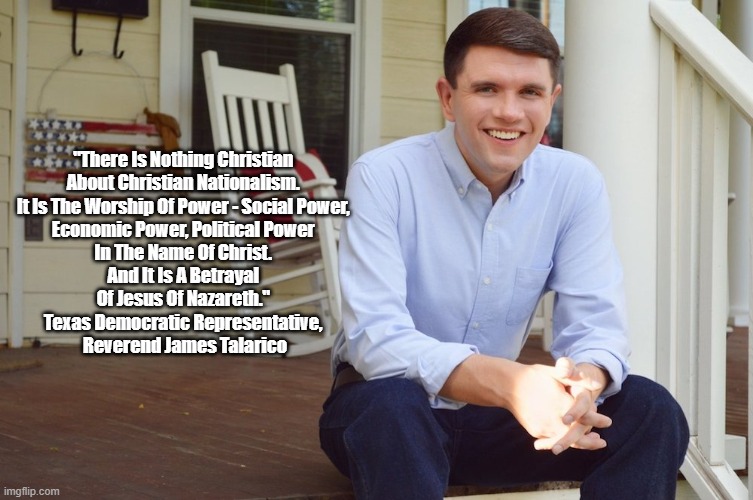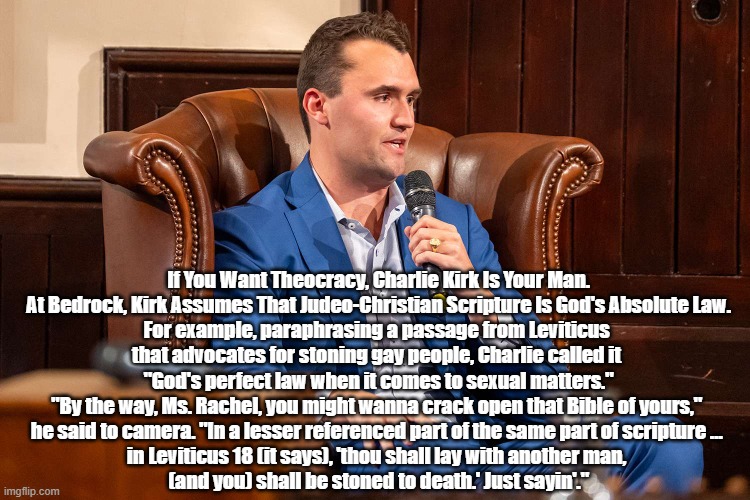Prove me wrong.
The Normalization Of Cruelty During Donald Trump's Administration: A Compendium
There is not a religious bone (or bone spur) in The Liar's body.
Furthermore, His Malignancy lies about it -- ALL THE TIME.
Meanwhile, Charlie Kirk -- and all the other lickspittle Trumpistas -- chow down on Trump's incessant torrent of lies as if they were dining at a 3-Star Michelin restaurant.
"The Love Of Money Is The Root Of All Evil" - An Open Invitation To Christian Conservatives
Here are my comments concerning Rachel Hurley's article below:
I’m looking at you, Ezra Klein.
While Kirk’s shooter was obviously overly steeped in internet whackadoo memelord culture - the “normies” don’t have a clue about how internet culture works at all.
Charlie Kirk wasn’t someone who was looking for honest debate. He was a political operative spreading hate and divisiveness. When you show his fans his racist, sexist or bigoted rhetoric - they defend it by saying “That’s not (racist, sexist, bigoted) - it’s true.” And that was his goal.
The whole “Prove Me Wrong” setup that made Kirk famous wasn’t really about proving anyone wrong. It was about creating content. Kirk mastered a specific type of performance that looked like debate but functioned more like a carefully orchestrated show designed to make his opponents look foolish and his positions seem unassailable.
The basic formula was simple - set up a table on a college campus, invite students to challenge conservative talking points, then use a combination of rhetorical tricks and editing magic to create viral moments. What looked like open discourse was actually a rigged game where Kirk held all the advantages.
First, there’s the obvious setup problem.
Kirk was a professional political operative who spent years honing his arguments and memorizing statistics. He knew exactly which topics would come up and had practiced responses ready.
Meanwhile, his opponents were typically 19-year-old students who wandered over between classes. It’s like watching a professional boxer fight random people at the gym - the outcome was predetermined.
Kirk used what debate experts call a corrupted version of the Socratic method. Instead of asking genuine questions to explore ideas, he’d ask leading questions designed to trap students in contradictions or force them into uncomfortable positions. He’d start with seemingly reasonable premises, then quickly pivot to more extreme conclusions, leaving his opponents scrambling to keep up.
The classic example was his approach to gender identity discussions. Kirk would begin by asking seemingly straightforward definitional questions - “What is a woman?” - then use whatever answer he received as a launching pad for increasingly aggressive follow-ups. If someone mentioned social roles, he’d demand biological definitions. If they provided biological definitions, he’d find edge cases or exceptions to exploit.
The goal wasn’t understanding or genuine dialogue - it was creating moments where students appeared confused or contradictory.
Kirk also employed rapid-fire questioning techniques that made it nearly impossible for opponents to fully develop their thoughts. He’d interrupt, reframe, and redirect before anyone could establish a coherent argument. This created the illusion that his opponents couldn’t defend their positions when really they just couldn’t get a word in edgewise.
The editing process was equally important. Kirk’s team would film hours of interactions, then cut together the moments that made him look brilliant and his opponents look unprepared. Nuanced discussions got reduced to gotcha moments. Students who made good points found those parts mysteriously absent from the final videos.
What’s particularly insidious about this approach is how it masquerades as good-faith debate while undermining the very principles that make real discourse valuable. Kirk wasn’t interested in having his mind changed or learning from others - he was performing certainty for an audience that craved validation of their existing beliefs.
The “Prove Me Wrong” framing itself was misleading. It suggested Kirk was open to being persuaded when the entire setup was designed to prevent that possibility. Real intellectual humility requires admitting uncertainty, acknowledging complexity, and engaging with the strongest versions of opposing arguments. Kirk’s format did the opposite.
This style of debate-as-performance has become incredibly popular because it feeds into our current political moment’s hunger for easy victories and clear villains. People want to see their side “destroying” the opposition with “facts and logic.” Kirk provided that satisfaction without the messy reality of actual intellectual engagement.
The broader damage extends beyond individual interactions. When debate becomes about humiliating opponents rather than exploring ideas, it corrupts the entire enterprise of democratic discourse. Students who got embarrassed in these exchanges weren’t just losing arguments - they were being taught that engaging with different viewpoints was dangerous and futile.
Kirk’s approach also contributed to the broader polarization problem by making political identity feel like a zero-sum game where any concession to the other side represented total defeat. His debates reinforced the idea that political opponents weren’t just wrong but ridiculous - a perspective that makes compromise and collaboration nearly impossible.
The most troubling aspect might be how this style of engagement spreads. Kirk inspired countless imitators who use similar tactics in their own contexts. The model of setting up situations where you can’t lose, then claiming victory when your rigged game produces the expected results, has become a template for political engagement across the spectrum.
Real debate requires vulnerability - the possibility that you might be wrong and need to change your mind. Kirk’s format eliminated that possibility by design. His certainty was performative rather than earned, and his victories were manufactured rather than genuine.
The tragedy of this approach is that college campuses actually need more genuine dialogue about difficult political questions. Students are forming their worldviews and wrestling with complex issues. They deserve engagement that helps them think more clearly, not performances designed to make them look stupid.
Kirk’s assassination represents a horrific escalation of political violence that has no place in democratic society. But it’s worth remembering that his debate tactics, while not violent, were themselves a form of intellectual violence that treated political opponents as objects to be humiliated rather than fellow citizens to be engaged.
I’ve turned down every podcast and interview request that’s come my way in the past few months. Two reasons. First, I have zero interest in making myself the story. Second, and more importantly, I’m not some oracle with instant answers on demand.
Podcasts and debates aren’t designed for real intellectual work. They’re built for entertainment. Serious thinking doesn’t happen in a soundbite. It requires time to wrestle with ideas, to sit with them, to test them against reality. My first reaction isn’t always my best one - and I’m honest enough to admit that. What feels true in the moment often crumbles under reflection. That’s why I’d rather write than perform.
Because while I also make my living from creating content - I refuse to mistake performance for truth.








No comments:
Post a Comment